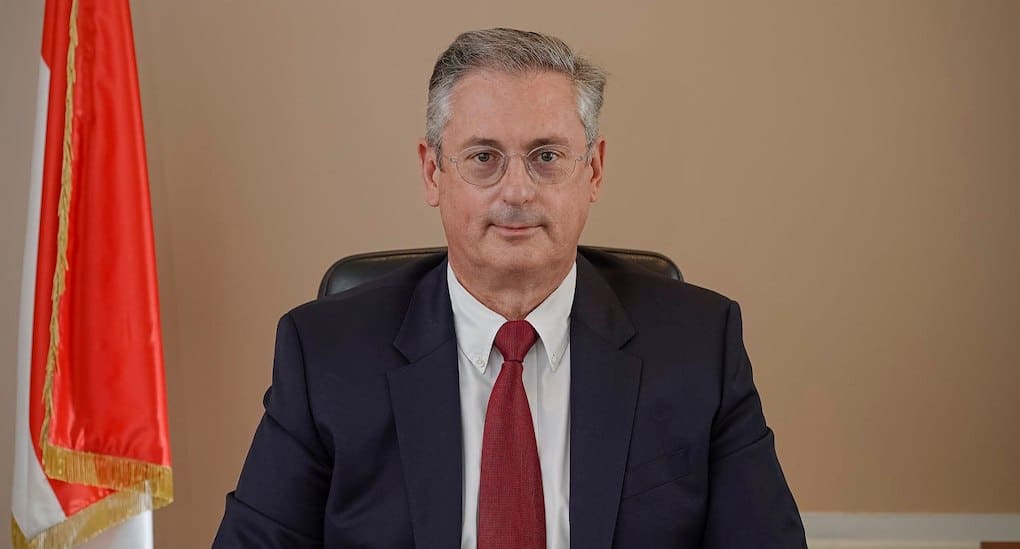Christophe Robino: “I want to give general medicine its proper place”

Our political interview of the month focuses on Christophe Robino, who was appointed Minister for Health and Social Affairs in April.
This is a new chapter in Christophe Robino’s ongoing story of commitment to the Principality. Appointed Minister for Health and Social Affairs in the Prince’s Government in April, leaving the position he held on the National Council, Christophe Robino spoke to us about his career.
After studying at the Faculty of Medicine in Nice, an internship and a clinical residency in Paris, at the Necker Hospital and the Georges Pompidou European Hospital as a nephrologist and critical care specialist, Christophe Robino finally returned to the Principality to work at the Princess Grace Hospital as head of department.
The doctor gradually became involved in the running of the institution, becoming President of the Collège de Formation Médicale Continue de Monaco (Ongoing Medical Training), then of the Union of Hospital Practitioners. He soon held other important positions, such as president of the Commission Médicale d’Etablissement (the hospital’s medical council) for five years, and as member of the CHPG board of directors.
He joined the Steering Committee of the ‘Union pour la Principauté’ in 2010, he served four terms on the Board of the Medical Council, before standing for the national elections in 2013 on the ‘Horizon Monaco’ list, then in 2018 on the ‘Primo’ list.
Armed with this professional experience, Christophe Robino now works as part of the Prince’s Government. He agreed to answer our questions and discuss his future plans in this new key position.
I feel very proud of the trust that has been put in me and very grateful to our Sovereign Prince who has always defended the hospital and social issues through our institutions.
How would you sum up your years on the National Council? What advice would you give to your successor?
They were extremely rewarding years. They enabled me to meet a great many people: civil servants, elected representatives, personalities from the Government and civil society, social partners with whom I tried to maintain the best possible relations. The objectives were to listen, to learn, to understand, to interact, so as to acquire political experience, knowledge of the field, and to be able to take part, under the authority of our Sovereign Prince of course, in the preparation of the legislative work that is essential for the proper operation of our institutions and their adaptation to international developments.
If I had one piece of advice to give to my successor, and friend, Marc MOUROU, as Chairman of the Commission for Social Interests and Various Affairs (CISAD), it is to always take the time to think things through, to seek advice from all parties before making a decision, and to know how to stand firm when necessary in the public interest. This is obviously not the easiest thing to do as an elected representative, but it is, in my opinion, one of the essential aspects of being a National Councillor that we owe to our constituents.
SEE ALSO : 3 projects to ease traffic coming into Monaco
How would you describe your experience at the CHPG?
It was a great adventure, both professionally and in human terms. I did my best to develop the department I directed, whether in my own speciality, Nephrology, with the creation of an acute dialysis unit, or for the other specialities related to it: Endocrinology, Neurology and Dermatology. I helped create the CFMCM and its accreditation by France as a medical further education establishment. There were also the beginnings of the Food and Nutrition Liaison Committee and then the Therapeutic Education Coordination and Liaison Committee, and especially the certification adventure with France. I was also able to defend the interests of the medical community within the Union of Hospital Practitioners, as well as the entire hospital community through the CME and the Board of Directors.
You are now Minister for Health and Social Affairs. How did this appointment happen?
I was simply approached to find out if I would be interested in the idea of serving my country other than by my profession and my duties as an elected official. You know the rest. I must say that I have been made very welcome by competent staff with whom I enjoy working.
The repatriation of the future Monegasque Supplementary Retirement Fund is essential for the future.
How did you feel when you were offered the position?
Very proud of the trust that has been put in me and very grateful to our Sovereign Prince who has always defended the hospital and social issues through our institutions.
What are your objectives and the issues you want to address as a priority?
There are many projects underway including, of course, the most visible one, which is the construction of the NCHPG which is a real challenge for the future.
We need to manage the aftermath of the COVID crisis and its human and social consequences. To that end, I wish to continue the dialogue with the social partners, taking broad representation into consideration.
The repatriation of the future Monegasque Supplementary Retirement Fund is essential for the future.
SEE ALSO: The ‘Caisse Monégasque de Retraite Complémentaire’ explained, in 3 minutes
I also need to work with my colleagues in the Government on measures to attract employment to the Principality, to improve commuter access, and to consider how to take hardship in certain professions into account.
And of course preserve and improve our social protection system, especially to support our seniors, but also with regard to child protection.
SEE ALSO: Frédéric Genta, a man with a mission to make the Principality more attractive
How do you view the health system in Monaco? Are there any areas for improvement that you think could be tackled?
It is, in many aspects, very efficient with a very comprehensive care offering and remarkable technical facilities.
It is of course necessary to consider the adaptation of existing health structures looking ahead to the NCHPG and the increasingly strong competition from establishments in the Alpes Maritimes with the recent arrival of several private health groups.
I would also like to think about repositioning general medicine, giving its proper place, in order to relieve the hospital structure of an increasing volume of non-urgent consultations in certain disciplines.
Finally, I would like to strengthen screening and prevention policies in general and, more particularly, with regard to elderly people returning home after hospitalisation, and their care at home.
During the health crisis, the Monegasque health system worked with neighbouring municipalities. Could this give new impetus to closer cooperation between France and Monaco?
I remain firmly convinced of the importance of the special relationship, and of the need to maintain active and dynamic cooperation, between our two countries This was particularly evident during the health crisis when, thanks to our bilateral agreements, we were able to benefit from France’s support for access to vaccines and, more recently, preventive or curative treatments against COVID-19 and, in return, to assist them by welcoming intensive care patients at a time when neighbouring establishments were overwhelmed.
I hope, through the exchanges we have with the French authorities, to strengthen these historic links and to perpetuate our collaboration, in particular through joint projects such as the Child Psychiatry Day Hospital, which will open soon in Beausoleil, the result of the collaboration between the teams of the LENVAL Foundation and the Monegasque authorities, and which will make it possible to accommodate 35 pupils with school integration issues, from France and Monaco, in response to a shared need.












